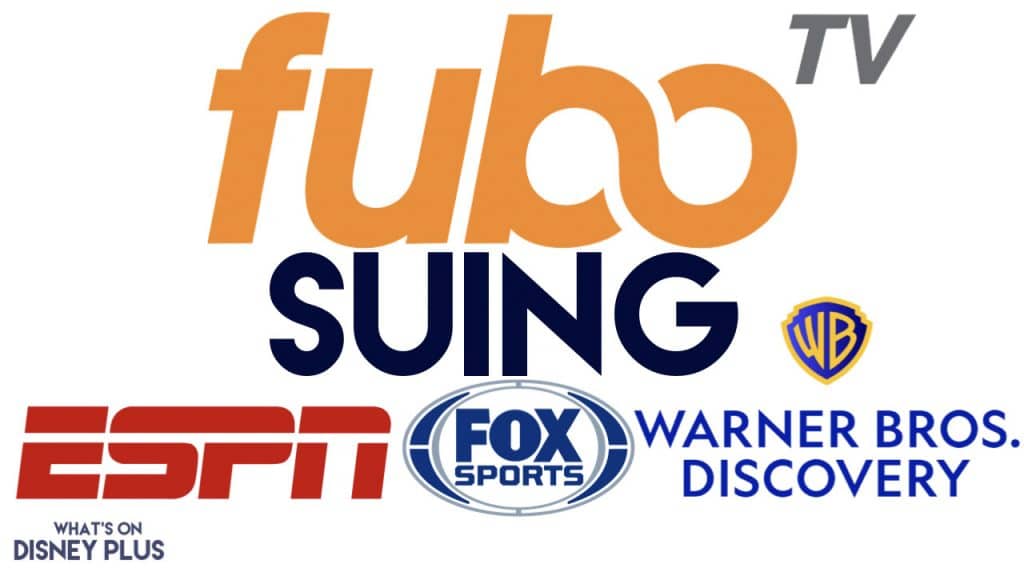
Fubo TV Suing Disney, Warner Brothers Discovery & Fox Over New Sports Streaming Service
Earlier this month, Disney announced it was going to be creating a brand new sports streaming service with Warner Brothers Discovery and Fox, which would bring together the companies’ portfolios of sports networks, certain direct-to-consumer (DTC) sports services – including content from all the major professional sports leagues and college sports, into a new app, which would also be bundled with Disney+, Hulu and/or Max.
All three companies would jointly own this new sports platform, and none of the content would be exclusive, so it would all still be available on each company’s own linear and streaming platforms. This new platform is aimed at people who haven’t had cable television, or are looking for an alternative. Disney is also planning on launching its new flagship ESPN streaming service in August 2025, which would also be integrated into Disney+ as a paid add-on like Hulu On Disney+.
The new sports streaming service is scheduled to launch in the fall of 2024, but it may get tied up in legal issues and held back. Last week, it was revealed that the Department of Justice was looking into the deal, and today, Fubo announced it has filed an antitrust lawsuit against The Walt Disney Company, FOX Corp., Warner Bros. Discovery, Inc. and their affiliates.
Fubo is alleging that the vertically integrated media companies have engaged in a years-long campaign to block Fubo’s innovative sports-first streaming business, resulting in significant harm to both Fubo and consumers. The complaint alleges that the forthcoming launch of a sports-streaming joint venture steals Fubo’s playbook and is the latest example of this campaign.
The Company claims that the Defendants have engaged in a long-running pattern of stymying Fubo’s sports-first streaming service by engaging in anti-competitive practices. Fubo was founded nine years ago to offer consumers a sports-first package of live TV streaming channels as a less expensive alternative to traditional cable bundles. However, as described in the complaint, “For decades, Defendants have leveraged their iron grip on sports content to extract billions of dollars in supra-competitive profits” by engaging in practices causing consumers to pay more for highly popular sports content and resulting in significant damages to both Fubo and its customers.
Fubo’s complaint describes the tactics the Defendants have taken to prevent Fubo from competing fairly in the marketplace. Such practices as outlined in Fubo’s legal papers include unfair “bundling” – forcing Fubo to carry dozens of expensive non-sports channels that Fubo’s customers do not want as a condition of licensing the Defendants’ sports channels.
In the lawsuit, Fubo states that there are other examples of anti-competitive behaviour cited in the complaint, including the Defendants charging Fubo content licensing rates that are as much as 30%-50%+ higher than rates they charge other distributors. Defendants also impose non-market penetration requirements (the percentage of total subscribers to which a content package must be sold to or cannot exceed) on Fubo. These actions individually and collectively increase the costs Fubo must pass onto customers. Fubo believes it has incurred billions of dollars in damages as a result of the Defendants’ actions.
Additionally, Fubo claims the Defendants have restricted Fubo from offering compelling streaming products that consumers would find desirable, despite similar products being offered by other traditional pay TV and streaming services, including the Defendants’ own Hulu service.
Fubo further alleges that the Defendants’ recently announced joint venture is simply the latest coordinated step in the Defendants’ campaign to eliminate competition in the sports-first streaming market and capture this market for themselves.
The Defendants have locked arms to remove further competition, according to Fubo’s complaint. Each Defendant is a media conglomerate that owns critical sports content and, according to the complaint, has individually engaged in anti-competitive behaviour against Fubo, resulting in harm to consumers. Together, the Defendants control more than half of the U.S. sports rights market. By combining to license their must-have sports content on a standalone basis to their own joint venture, other distributors, including Fubo, would be at an extreme competitive disadvantage to the detriment of millions of U.S. consumers, according to the complaint.
David Gandler, Co-founder and CEO, Fubo said in a statement regarding the lawsuit:
“Each of these companies has consistently engaged in anticompetitive practices that aim to monopolize the market, stifle any form of competition, create higher pricing for subscribers and cheat consumers from deserved choice. By joining together to exclusively reserve the rights to distribute a specialized live sports package, we believe these corporations are erecting insurmountable barriers that will effectively block any new competitors from entering the market. This strategy ensures that consumers desiring a dedicated sports channel lineup are left with no alternative but to subscribe to the Defendants’ joint venture.
We have previously collaborated with each of these companies so that we could offer ‘must-have’ sports content to Fubo customers. For many years, they have challenged our business at every opportunity through pernicious practices. While other new competitors were prevented from entering the market, Fubo has continuously fought back. The Defendants’ unconscionable practices have impacted our ability to grow and have deprived consumers of a compelling and competitively-priced product.
Simply put, this sports cartel blocked our playbook for many years and now they are effectively stealing it for themselves.
Silence is no longer an option. The fact that live sporting events dominated television viewership in 2023, with 97 of the top 100 broadcasts, highlights the critical importance of sports in entertainment and the necessity for its broad dissemination. Reports that the Department of Justice intends to look into the joint venture are encouraging, and it evidences the potential negative and widespread impact this alliance will have.
Fubo seeks equal treatment in terms of pricing and all relevant conditions from these media giants to ensure we can compete fairly for the benefit of consumers. Our customers deserve access to a competitively priced offering with innovative features designed by Fubo for an unparalleled sports viewing experience.”
In the lawsuit, Fubo is seeking for the new sports platform to be shut down by a court order. If they can’t get that, Fubo wants economic parity of licensing terms and to get paid substantial damages by the companies.
There were always going to be some bumps in the road with the announcement of this new sports streaming service, and it’s only logical that Fubo wouldn’t be happy with this system since it would undercut their business. The fact that Fubu has been trying to do this for years but was blocked by the channel owners, and now that the studios are trying to cut out the middleman, Fubo’s business could be at risk if this new platform does launch.
This lawsuit is likely to have major repercussions across the linear and streaming business; if Fubo wins, it could set back Disney’s plans and result in major expenses for the three networks, but if it loses, Fubo TV would likely struggle to compete in the future. It’s also possible that other companies will join in with this lawsuit who also want to offer a smaller cable bundle.
With the US cable business in decline, the major networks are all looking to make drastic changes to continue trading, and this lawsuit will likely have major implications either way.
Do you think Fubo is right? Or do you think the three networks should be able to sell their networks how they want? Let us know on social media!




